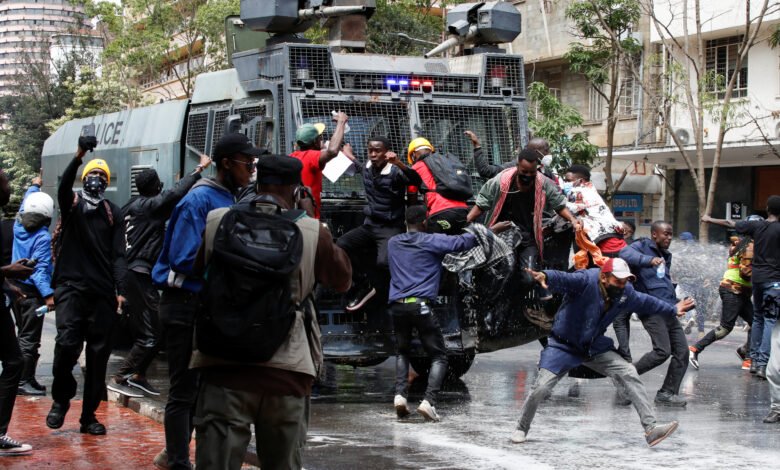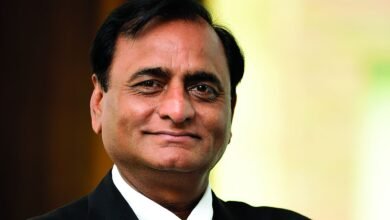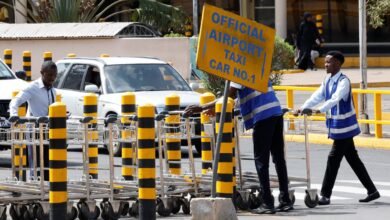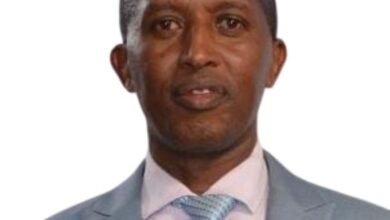
Kenyans returned to the streets on Wednesday under tight security to commemorate the first anniversary of the anti-government protests that culminated in the storming of Parliament on June 25, 2024.
It was a daring event that left over 60 youthful Kenyans dead and marked one of the most turbulent moments of President William Ruto’s tenure.
Last year’s protests were initially sparked by proposed tax hikes, under the controversial Finance Bill, 2024, which were later withdrawn by President Ruto following public pressure. However, public anger over the heavy-handed response by security forces has continued to simmer.
That outrage has been reignited this month by the death of 31-year-old blogger and teacher Albert Ojwang, who died in police custody.
On Tuesday, six individuals—including three police officers—were charged with Ojwang’s murder. All pleaded not guilty.
Ojwang’s death has become a symbol of the unresolved trauma from last year’s demonstrations, where more than 60 people were reportedly killed. Many Kenyans blame security agencies for the fatalities and for a spate of enforced disappearances during the unrest.
On Wednesday, police in full anti-riot gear cordoned off key roads leading into Nairobi’s central business district, significantly restricting movement.
Also Read: US, European Envoys Concerned About Hired Goons Ahead of Gen Z Protest on June 25
A day earlier, the Ministry of Interior had posted a warning on X (formerly Twitter), cautioning protesters not to “provoke police” or “attempt to breach protected areas.”
The violent scenes from June 25 last year, when protesters broke through barricades and entered Parliament while police fired live rounds, triggered both national outrage and concern from Kenya’s international partners.
In a joint statement issued Tuesday, the embassies of the United States, United Kingdom, Canada, and other European nations urged restraint and protection of the right to peaceful assembly.
“The use of plainclothes officers in unmarked vehicles erodes public trust,” the statement said, echoing widespread criticism from human rights organizations. The presence of unidentified officers during past protests has drawn sharp condemnation.
The diplomatic community also expressed concern over reports that hired individuals had been used to disrupt peaceful protests.
Last week, journalists and protesters at large witnessed groups of men armed with sticks and whips attacking demonstrators. These men have since defended their actions, claiming they were “patriots” safeguarding public property, not hired thugs.
Responding to the diplomatic concerns, Kenya’s Ministry of Foreign Affairs said on Tuesday evening that any violations by police would be handled through established state institutions, including Parliament and the judiciary.
“The ministry reminds all that diplomatic partnerships flourish best in mutual respect, open channels, and a recognition of each other’s unique governance contexts,” it said in a statement.
Meanwhile, two police officers were arrested last week in connection with the fatal shooting of an unarmed protester by the name Brian Kariuki, during demonstrations over Ojwang’s death. Initially, Kenya’s police chief had suggested that Ojwang had died by suicide, but later retracted the statement and issued an apology after a post-mortem revealed signs of physical assault.
As Kenya reflects on the events of the past year, demands for police accountability and the protection of civil liberties remain central to the national conversation.






I discovered your blog site on google and check a few of your early posts. Continue to keep up the very good operate. I just additional up your RSS feed to my MSN News Reader. Seeking forward to reading more from you later on!…
I was curious if you ever considered changing the page layout of your site? Its very well written; I love what youve got to say. But maybe you could a little more in the way of content so people could connect with it better. Youve got an awful lot of text for only having 1 or two pictures. Maybe you could space it out better?
Deference to author, some great selective information.
Hi! Quick question that’s totally off topic. Do you know how to make your site mobile friendly? My website looks weird when browsing from my iphone 4. I’m trying to find a theme or plugin that might be able to fix this problem. If you have any suggestions, please share. Thanks!
What i do not realize is actually how you are no longer really much more neatly-favored than you might be now. You’re very intelligent. You recognize thus significantly relating to this matter, made me personally consider it from a lot of numerous angles. Its like men and women are not fascinated except it¦s something to do with Girl gaga! Your personal stuffs outstanding. All the time handle it up!
I am often to blogging and i really appreciate your content. The article has really peaks my interest. I am going to bookmark your site and keep checking for new information.
I just could not leave your site before suggesting that I extremely enjoyed the usual info a person supply on your visitors? Is gonna be again ceaselessly in order to inspect new posts.
Great write-up, I am regular visitor of one’s blog, maintain up the nice operate, and It is going to be a regular visitor for a long time.
This web site is really a walk-through for all of the info you wanted about this and didn’t know who to ask. Glimpse here, and you’ll definitely discover it.
Undeniably believe that which you stated. Your favorite justification seemed to be on the internet the simplest thing to be aware of. I say to you, I definitely get irked while people think about worries that they plainly do not know about. You managed to hit the nail upon the top and also defined out the whole thing without having side effect , people could take a signal. Will probably be back to get more. Thanks
We are a gaggle of volunteers and opening a new scheme in our community. Your site provided us with useful information to work on. You have performed an impressive activity and our entire group shall be thankful to you.
I have not checked in here for some time since I thought it was getting boring, but the last few posts are good quality so I guess I’ll add you back to my daily bloglist. You deserve it my friend 🙂
Rattling instructive and wonderful body structure of subject matter, now that’s user pleasant (:.
Of course, what a splendid website and educative posts, I surely will bookmark your site.Best Regards!
Helpful info. Lucky me I found your website by chance, and I’m surprised why this twist of fate did not took place earlier! I bookmarked it.
After study a few of the blog posts on your website now, and I truly like your way of blogging. I bookmarked it to my bookmark website list and will be checking back soon. Pls check out my web site as well and let me know what you think.
Magnificent items from you, man. I have be aware your stuff prior to and you are just extremely wonderful. I actually like what you have acquired here, certainly like what you’re stating and the best way in which you assert it. You are making it enjoyable and you still take care of to stay it wise. I can not wait to read much more from you. This is actually a wonderful website.
Thanks so much for giving everyone such a special opportunity to read critical reviews from here. It really is very awesome and also jam-packed with a great time for me personally and my office peers to search your site really thrice in 7 days to see the newest guidance you will have. Not to mention, I’m just always pleased with all the astonishing hints you give. Certain 3 points in this article are undeniably the most efficient we have had.
The root of your writing while sounding reasonable at first, did not really work properly with me after some time. Someplace within the paragraphs you managed to make me a believer but just for a short while. I however have got a problem with your jumps in logic and you might do well to fill in all those breaks. If you actually can accomplish that, I could undoubtedly end up being amazed.
Keep working ,remarkable job!